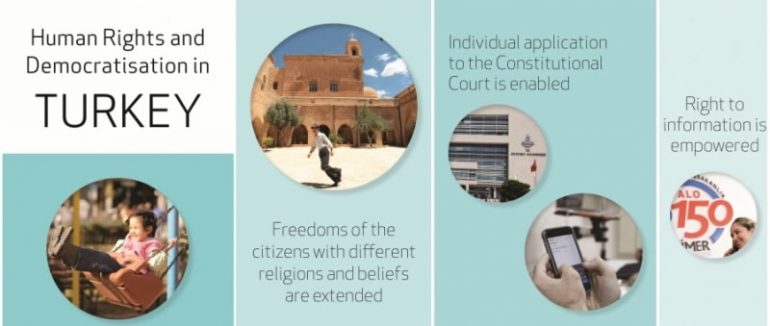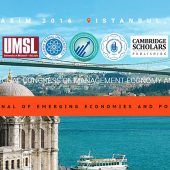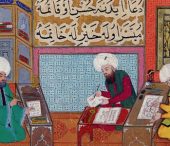Since the adoption of Universal Declaration of Human Rights in 1948, a significant progress has been made globally in respect of human rights. In Turkey, adoption of reforms aiming at fundamental rights and freedoms has vastly accelerated. Regulations enabling every citizen to enjoy fundamental rights and freedom have put into practice.
Human Rights Day is observed every year on 10 December to commemorate the day on which, in 1948, the United Nations (UN) General Assembly adopted the Universal Declaration of Human Rights. Following the Declaration’s adoption in 1948, the modern description of human rights has been shaped as “fundamental rights which are inherent in all human beings regardless of their nation, ethnic origin, language, religion, gender or any other status.”
With a view to improving fundamental rights and freedoms in accordance with universal criteria, Turkey has taken necessary steps in order to harmonise its domestic legal systems with international conventions and inspection mechanisms. In the meantime, Turkey has introduced a number of regulations to ensure that its people can enjoy fundamental rights and freedoms with an understanding of equal citizenship.
Adoption of the principle that international agreements in the area of fundamental rights prevail over domestic law was a significant step in the protection and improvement of human rights. “UN International Covenant on Civil and Political Rights” and “UN International Covenant on Economic, Social and Cultural Rights” (1966), which are known as the “twin covenants” and which constitute two of the most important universal documents in the field of human rights, were ratified within the scope of integration of international law.
Policy of zero tolerance to torture
Within the context of “zero tolerance to torture” policy, detention conditions have been improved and police stations modernised. The “Optional Protocol to the United Nations Convention against Torture and Other Cruel, Inhuman or Degrading Treatment or Punishment” and “The Council of Europe Convention on the Prevention of Terrorism” have been ratified. Prisons not meeting UN and Council of Europe standards have started to be closed down.
Series of Reforms within the scope of European Union (EU) Harmonisation packages
Death penalty is abolished in accordance with the EU harmonisation commitments. Within the Second EU Harmonization Package, passed in 2002, the Law on Political Parties was amended and as a milestone in democratisation of Turkey, closure of a political party became more difficult. Within the scope of the Third EU Harmonization Package, European Court of Human Rights judgments against Turkey are recognized as grounds for a new trial procedure in civil and criminal cases. Thereby, the ambiguity regarding the normative value of agreements on fundamental rights and freedoms was removed.
Individual Application to the Constitutional Court
One of the most significant improvements with regard to human rights in Turkey is the introduction of procedure of individual application to the Constitutional Court. The Law no.5982 including important amendments to the judicial provisions of the Constitution was adopted through a referendum dated 12 September 2010. In consequence of these amendments, the right to individual adoption to the Constitutional Court was introduced as a new method of legal remedies. As an extremely important issue in a world of ever-improving communication technologies, personal data protection is taken under constitutional guarantee.
Political propaganda in different languages
Reforms such as extension of public servants’ rights to apply to courts and increasing guarantees to political parties have become milestones in democratisation of Turkey. Establishment of the Institution of Ombudsman as well as the Human Rights Institute of Turkey have strengthened Turkey’s institutional structuring in human rights.
Regulations enabling civil servants to resort to jurisdiction, providing more freedom to political parties and safeguarding the latter are among significant reforms in politics. Establishment of the Institution of Ombudsman and Human Rights Institute of Turkey have strengthened Turkey’s institutional structuring in human rights. Democratisation Package declared in 2013 has paved the way for conducting political propaganda indifferent languages and dialects.
Adoption of Right to Information
Right to Information was included in the legislation in 2003 and a new law on associations was put into practice in 2004 with a view to enlarging the civil society course. A new “Law on Trade Unions and Collective Bargaining Agreement” was adopted in 2012, which provided a new perspective towards labour relations. The enactment of a modern press law, ended the practice of closing down and confiscating publishing houses.
Equal citizenship
A large number of reforms have been realised within the scope of “equal citzenship” principle. Freedom of worship for citizens belonging to various religious groups has been broadened. It has become easier for minorities’ community foundations to acquire new real estate, and upon many properties, which were confiscated previously, have registered in the foundations’ names.
Significant steps have been taken with regard to women’s and children’s rights particularly in the last decade in Turkey. The “Law to Protect Family and to Prevent Violence against Women” has entered into force. In addition, Turkey has become a party to the “Council of Europe Convention on preventing and combating violence against women and domestic violence” and the “Council of Europe Convention on the Protection of Children against Sexual Exploitation and Sexual Abuse”.
Source: http://kdk.gov.tr/en/










